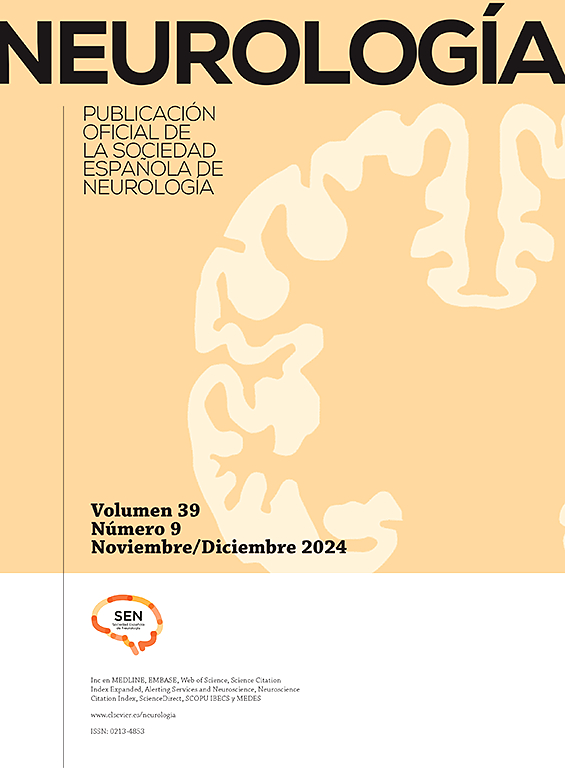The sensitive Amnesia Light and Brief Assessment (ALBA) is a valid 3-min test of 4 tasks indicative of mild cognitive deficits
IF 3.1
4区 医学
Q2 CLINICAL NEUROLOGY
引用次数: 0
Abstract
Background and purpose
We report the development and validation of a unique, easily administered, but cognitively demanding 3-min test that does not require aids and can detect mild cognitive deficits (MCD).
Methods
The innovative Amnesia Light and Brief Assessment (ALBA) consists of 4 tasks: encoding the 6-word sentence “Indian summer brings first morning frost,” sequential demonstration of 6 gestures and their immediate recall, and final recall of the original sentence. The memory ALBA score is the sum of all correctly recalled sentence words and gestures. The ALBA was performed in 590 persons older than 50 years, including 60 individuals who completed a neuropsychological battery, equally divided into patients with MCD (Montreal Cognitive Assessment [MoCA] score of 21 ± 3 points) and matched cognitively normal (CN) individuals (MoCA of 27 ± 2).
Results
Compared to CN individuals, the patients with MCD recalled fewer correct sentence words (median, 5 vs 2) and gestures (4 vs 3), and had lower memory ALBA scores (10 vs 6) (all comparisons, P < .00001). The cut-off point for the memory ALBA score was ≤8, with 90% sensitivity, 77% specificity, and an AUC of 0.90. Memory ALBA score correlated significantly with all neuropsychological tests except the Digit Span forward. The ALBA was minimally associated with education and age in the normative sample.
Conclusions
The novel and efficient ALBA test was confirmed to have high discriminant and convergent validity, even in patients with mild cognitive deficits. The ALBA is an ultra-brief and universal cognitive test suitable for assessing cognitive impairment, dementia, and other conditions. It can easily be adapted to other cultures and administered under various conditions and settings in clinical practice and research.
灵敏遗忘轻与短暂评估(ALBA)是一种有效的3分钟4个任务的测试,表明轻度认知缺陷
背景和目的我们报告了一种独特的,易于管理的,但对认知要求高的3分钟测试的开发和验证,该测试不需要辅助,可以检测轻度认知缺陷(MCD)。方法创新的遗忘轻简评估(ALBA)由4个任务组成:对6个单词的句子“印度的夏天带来了第一个早晨的霜冻”进行编码,顺序演示6个手势及其即时记忆,最后回忆原句子。记忆ALBA分数是所有正确回忆的句子、单词和手势的总和。在590名50岁以上的老年人中进行了ALBA,其中60人完成了神经心理学测试,平均分为MCD患者(蒙特利尔认知评估[MoCA]评分21±3分)和匹配的认知正常(CN)患者(MoCA评分27±2分)。结果与CN个体相比,MCD患者回忆起的正确句子单词(中位数,5比2)和手势(中位数,4比3)较少,记忆ALBA评分(10比6)较低(所有比较,P <;.00001)。记忆ALBA评分的截止点≤8,灵敏度90%,特异性77%,AUC为0.90。记忆ALBA得分与除数字跨距外的所有神经心理测试均显著相关。在规范样本中,ALBA与教育程度和年龄的关系最小。结论ALBA测试具有较高的判别效度和收敛效度,适用于轻度认知障碍患者。ALBA是一种超简短和通用的认知测试,适用于评估认知障碍、痴呆和其他疾病。它可以很容易地适应其他培养,并在临床实践和研究中的各种条件和设置下进行管理。
本文章由计算机程序翻译,如有差异,请以英文原文为准。
求助全文
约1分钟内获得全文
求助全文
来源期刊

Neurologia
医学-临床神经学
CiteScore
5.90
自引率
2.60%
发文量
135
审稿时长
48 days
期刊介绍:
Neurología es la revista oficial de la Sociedad Española de Neurología y publica, desde 1986 contribuciones científicas en el campo de la neurología clínica y experimental. Los contenidos de Neurología abarcan desde la neuroepidemiología, la clínica neurológica, la gestión y asistencia neurológica y la terapéutica, a la investigación básica en neurociencias aplicada a la neurología. Las áreas temáticas de la revistas incluyen la neurologia infantil, la neuropsicología, la neurorehabilitación y la neurogeriatría. Los artículos publicados en Neurología siguen un proceso de revisión por doble ciego a fin de que los trabajos sean seleccionados atendiendo a su calidad, originalidad e interés y así estén sometidos a un proceso de mejora. El formato de artículos incluye Editoriales, Originales, Revisiones y Cartas al Editor, Neurología es el vehículo de información científica de reconocida calidad en profesionales interesados en la neurología que utilizan el español, como demuestra su inclusión en los más prestigiosos y selectivos índices bibliográficos del mundo.
 求助内容:
求助内容: 应助结果提醒方式:
应助结果提醒方式:


